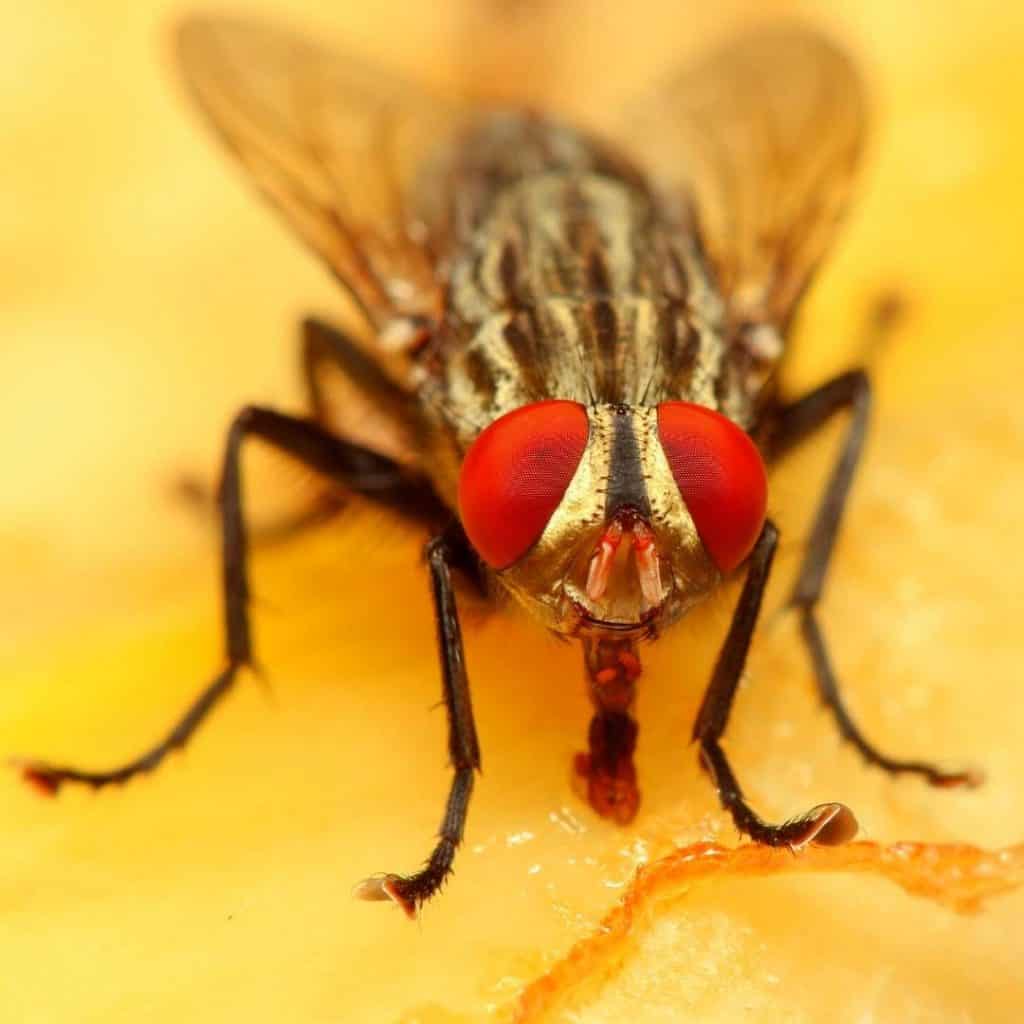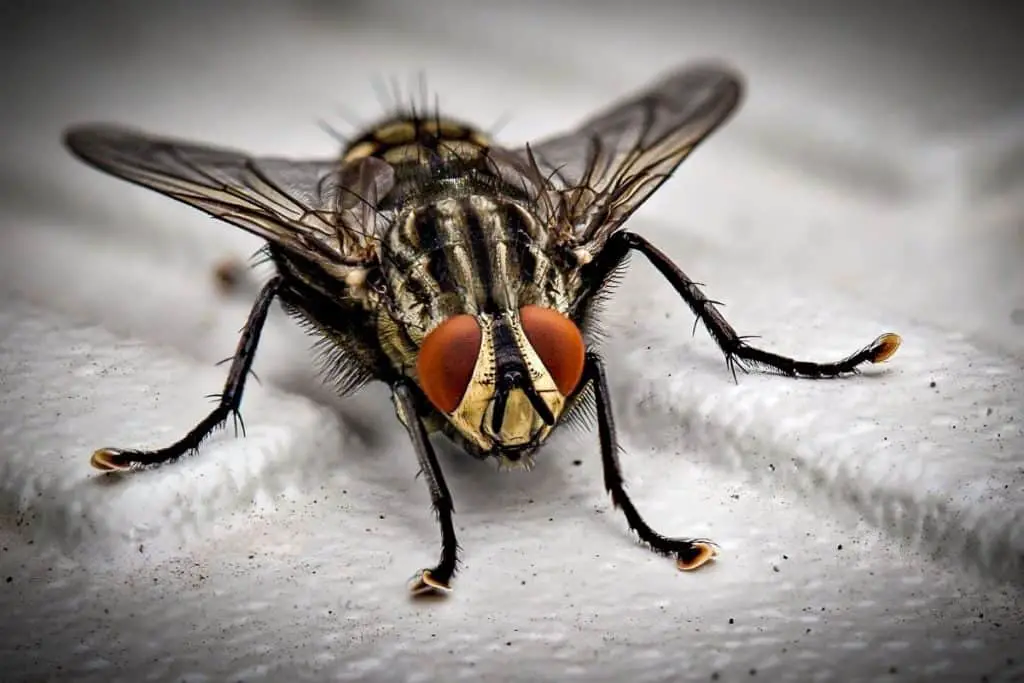Disclosure: We may earn money or products from the companies mentioned in this post.
Keeping rabbit hutches safe from flies is a daunting task and it comes with a host of challenges, but there’s a solution for everything and luckily, I have found those ways to rid of rabbit cages of flies and prevent flies in your rabbit hutch!
Flies are attracted to rabbit hutches because of rabbits’ urine, litter, and feces. They can lay eggs on rabbit’s poop, litter, and even on the bun, leading to a life-threatening health condition called ‘Fly Strike.’
The more you study Fly Strike disease, the scarier it gets… And you would never want your rabbit to go through this condition.
Fortunately, there are ways to prevent rabbit hutches from flies and the dangers of flies to rabbits.
In this article, I’ll discuss why flies are attracted to rabbits, how to get rid of flies in rabbit hutches, and much more — Stay tuned!

Why Are Flies Attracted to a Rabbit’s Hutch?
There are a few reasons why flies may be attracted to rabbit hutches.
- Feces and Urine: Rabbits generally have feces and urine around them, which is why flies are drawn to them. Flies lay their eggs in feces and urine, so it’s an ideal place for them to reproduce.
- Sticky Poops: Some rabbits produce sticky poops (excess cecotropes) that often get stuck on their furs. Such rabbits become very attractive to flies.
- Litter: Rabbits like to scratch around in their litter box, often leaving pieces of poop and urine that fly larvae can feed on. In a rabbit hutch, this can lead to flies laying eggs on the bun or around the edge of the nest.
- Dampness: The surrounding environment can be moist, which is perfect for flies to lay eggs. A rabbit’s hutch is more vulnerable to flies if it is placed near a water source or in moist weather.
Are Flies Harmful to Rabbits?
Flies are extremely harmful to rabbits due to a condition called ‘Fly strike’ caused by flies laying eggs on rabbits’ skin. Fly larvae hatch and feed on the rabbit’s blood. If not killed or prevented from developing fully, these parasites can lead to death in very young rabbits.
A lack of care can turn out to be a deadly experience for the rabbits.
Fly Strike usually happens during the summer months (from June to October). So, one needs to take extra care during this time.
What happens is that the flies are attracted to rabbits’ urine, damp fur, feces, and their stink of pet rabbits. The flies’ reproductive cycle is super fast, they land on a rabbit and lay eggs on them that turn into maggots within 24 hours! Imagine the speed of infestation at this reproductivity rate.
What Kind Of Rabbits Are Vulnerable To Flies?
There are some characteristics that put rabbits at a greater risk of being attacked.
- Obese Rabbits
- Wounded Rabbits
- Rabbits that pee quite often.
- Rabbits whose poop sticks to their furs.
- Rabbits with soiled hair and skin.
- Rabbits with poor diet
- Rabbits with dirty hutches
- Rabbits that have health conditions like arthritis, dental problems, or they are aged.
- Female rabbits with large dewlaps that prevent them from cleaning themselves.
To be honest, flies are obnoxious and they can attack each and every rabbit. However, the ones listed are more likely to get hit by flies.
8 Signs of Fly Strike in Rabbits
Flystrike is horrendous and it must be kept at bay all the time, no matter what. There are some signs that can tell if your rabbit has become a victim of flystrike:
1. Bunny Has Lost Appetite
If your bunny isn’t eating, it may be a sign that they are struggling to fight off the fly parasites. The bunny won’t eat or drink regularly if it’s infested by flies maggots.
Rabbits are sensitive and they lose their appetite if something is wrong with them. Check their furs to confirm if it’s because of Fly Strike.
2. Bunny is Losing Fur
Rabbits with Fly Strike will lose fur in patches. As flies lay eggs on the rabbit, they will eat away at the skin and fur until there’s nothing left.
The fur will seem thinner and the rabbit will look sick.
3. You See Maggots in Your Rabbit’s Fur
If you notice maggots in your bunny’s fur, it’s a sure sign that they have Fly Strike. Flies lay eggs on the rabbit and then their bodies hatch into these disgusting creatures that eat the rabbit alive.
4. Bunny Being Quiet
If your bunny is constantly being picked on by flies, they will tend to be quiet and withdrawn. They might also have trouble grooming themselves.
5. Bunny Has Sores and Wounds
Due to the intense biting of maggots, rabbits are often left with open wounds and sores on their skin. In Fly Strike, rabbits have to go through very painful times.
The maggots will feed on the rabbit’s skin and later on flesh until the rabbit dies.
6. Bunny is Fuzzy and Itchy
If your bunny starts to become overly fluffy, it may be due to flystrike. The parasites infest the hair follicles on your rabbit’s skin, which causes the fur to thickened and gives the rabbit an itchy sensation.
7. Bad Smell Coming Out of Rabbit’s Hutch
If the smell coming out of your bunny’s hutch is terrible, it could be because they are infested with flies and their rotting flesh is now producing a strong smell.
8. Bunny is Lazy or Lethargic
When a bunny suffers from Fly Strike, it may become lazy and disinterested in its surroundings. They will spend most of their day sleeping or not playing with their toys. Oftentimes, they might even get scared of you.
9. Bunny Has Collapsed
Another sign (and most severe one) of Fly Strike is when a bunny collapses or seems to faint. When this condition gets severe, the bunny might not be able to walk or move at all.
Fly Strike is a life-threatening condition that requires immediate medical attention. If you notice any of the following signs, please take your bunny to the vet as soon as possible.
It can kill your precious little bunnies and if you can’t tell whether your bunny has been infected, immediately take it to a vet for help.
Here are some ways to annihilate the flies from the bunny’s hutch and keep your adorable pets nice, clean, and healthy.

8 Ways To Prevent Rabbits From Fly Strike
1. Check Your Rabbit’s Bum
Properly check your rabbit’s bum for infestations and then clean it properly. You need to practice this twice daily in summers and once in winters — No, it’s not that difficult! Whenever you play with your bun or carry him, just brush your hands and arms against fur.
If your rabbit is overweight or is unable to look after itself, you should groom it regularly to avoid the mess that it can create with its urine and poop. A soiled bunny is more likely to be attacked by flies than a clean one.
2. Keep a Check On Your Bunny’s Diet
A good bunny diet can prevent rabbits from Fly Strike and other diseases by simply strengthening their immune system. You need to make sure your rabbit is eating properly. Keep a check on its diet because most of the time, when a bunny doesn’t eat properly, it gets prone to illnesses or is sick already.
A rabbit’s teeth keep growing continuously and that prevents it from eating properly. If that happens, make sure you visit a vet and get it checked. Vets cut the bunny’s teeth with wire cutters or a process called burring. Once the teeth are short, the rabbit will eat properly and keep itself clean.
Another important thing to note here is to keep your rabbit’s diet the same at all times.
Rabbits are herbivores, so they require a high-fiber diet. Ensure that you give them enough hay and grass.
Changing the diet can upset your bunny’s stomach, which can eventually cause soft feces. As a result, this will make the bunny dirty and prone to flystrike.
3. Clean the Rabbit Hutches
Rabbits poop a lot in general, so you need to check that their feeders are sanitized properly because dirty hutches can be a breeding ground for flies. And we know flies are obnoxious, so it’s better to get rid of them.
Plastic hutches are easier to clean rather than wooden hutches.
Clean your rabbit’s hutch with a disinfectant once every two to three days. If the poop and pee stink gets unbearable, allow the hutch to dry under the sun. You can also place pine shavings inside the hutch to control the odor.
4. Reduce Your Rabbit’s Weight
Overweight rabbits tend to get dirtier than normal ones. For them, it is difficult to squat properly while pooping and peeing and it even puts a strain on their joints.
So, make sure you make your rabbit lose weight. Once the rabbit has attained a normal weight, it can clean itself properly.
5. Take Your Rabbit To A Vet
If you suspect something unusual in your pet rabbits like decreased food intake, dental problems, or trouble urinating then it is best to take it to a rabbit vet. A health professional can diagnose the problem and then recommend an appropriate treatment.
Ask the vet for anti-inflammatory medicine if your rabbit has arthritis. Quite often, joint pain can cause pain while squatting and prevent the rabbit from cleaning itself.
6. Trim Your Rabbit’s Long Hair
It is best to clip your bunny’s hair short once or twice a year so that they don’t have to clean themselves as much.
If you have a pet rabbit that constantly poops and pees in its hutch, shortening its hair may help them clean itself more effectively.
7. Use Homemade Fly Remedies
In order to keep the pesky flying troublemakers away from the hutches, there are a couple of useful homemade remedies. These homemade remedies are perfect for repelling flies.
Usually, you can use crushed garlic cloves or peels and scraps in the hutch. However, you have to ensure that rabbits don’t get near these garlic cloves/scraps. This is because garlic is extremely harmful and toxic when consumed in large chunks by your rabbit. Thus extreme care is very important.
Alternatively, you can also use aromatic herbs e.g. basil, lavender, or mint with the hutch. It is also important to note that you need to replace these herbs with fresh ones. This is very important and is often at times required.
8. Keep the Rabbit’s Hutch Fresh
You can decorate the hutches using sprigs or bouquets of fresh rosemary. Other aromatic herbs would also do the charm. There are various mint herbs you can use too except Pennyroyal. Basil and lavender are also good alternatives.
The reason for the freshness and beautification of these herbs is that the flies will repel as they are not fond of them. You have to ensure to modify and maintain these herbs regularly.
If older ones dry out, then replace them with a fresh batch of fresh herbs. This will go a long way in preventing flies from infiltrating the rabbit hutch.
9. Use a Fly Strike Preventive Product
There are various fly strike preventive products you can use to prevent flies from entering the hutches. I would personally recommend Rearguard because it is a natural product and does not have any harmful side effects on rabbits.
The rearguard comes with a built-in applicator sponge and is ready to use in a bottle. Before applying, gently press the sponge to break the valve. The sponge applicator is then used to apply the product, ensuring that the rabbit fur is thoroughly wetted with the solution from the middle of the back to the tip of the tail.
The areas under the tail and between the back legs should be given special attention.
These measures ensure that flies don’t come near the rabbit hutch or the rabbits. Rabbits are often vulnerable around flies. It is best that flies don’t come near them, ensuring that rabbit doesn’t become attracted to the flies.
Do you have any other tips to share? Comment below!
